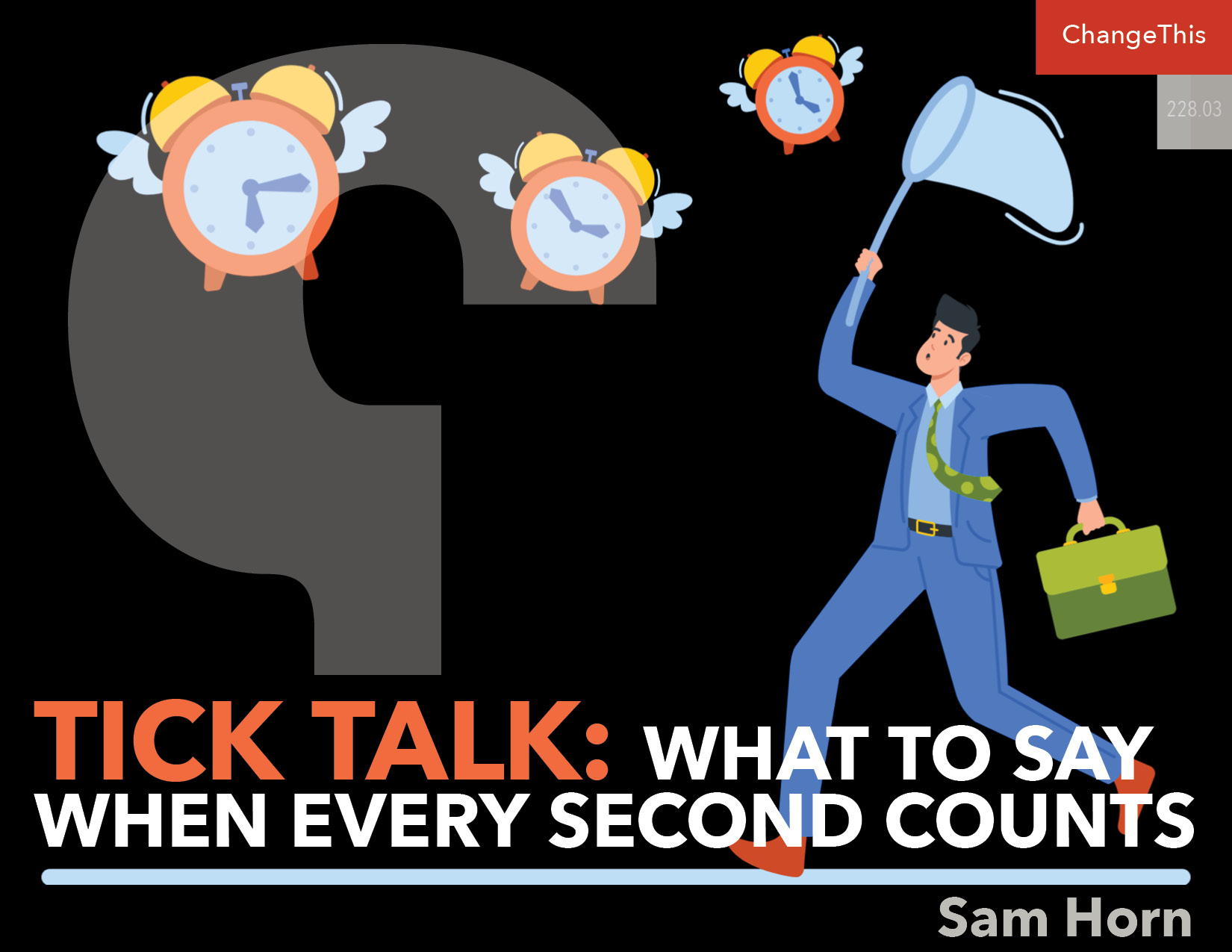TICK TALK: What to Say When Every Second Counts
“Tell me to what you pay attention, and I will tell you who you are.”
— Jose Ortega y Gassett
To riff off that, tell me who pays attention to your priority, and I will tell you where you’ll succeed.
This is the Attention Economy. The success of your ideas, projects and goals depends on whether you’re able to capture/keep people’s precious attention.
The good news is, you can learn how to do that right here, right now.
The most important thing to understand is, “We don’t have all day, people.”
In today’s short-attention-span workplace, the clock starts ticking the second we start talking.
People are busy. If we take a long time to get to the point, they won’t be listening by the time we get there. If we’re long, they’re gone.
If we want to win people’s valuable attention, we need to hit the ground running. We need to do what I call TICK TALK.
TICK TALK communication is crystal clear, concise, compelling... and QUICK. Here are a few ways to TICK TALK in the first 60 seconds.
-
Address time up front. Say, “I know you’re busy, this will be TWO MINUTES TOPS.” By acknowledging they have other things competing for their attention and promising to keep your comments short, people are motivated to pay attention because you’ve promised this will be brief.
-
Relieve their anxiety. Did you know anxiety can be defined in two words, “Not knowing.” If people don’t know how this pertains to them, they have no reason to listen because they’re not sure how this is relevant. Say in the first sentence how this relates to their priorities so they trust this will a good use of their time. Say, “I’ve got the results of that survey we took last week.”
-
Ask yourself, “Why will they resist?” and say it first. If you don’t voice their pushback, they won’t be listening, they’ll be waiting for you to stop talking so they can tell you why this won’t work. Say, “You may be thinking...” and then fill in their concern. Please note: Don’t say, “I KNOW you’re thinking...” because that’s presumptuous. Say, “You might be wondering...” and then fill in their doubts. For example, “You might be wondering how we can afford this. Good point, I’ve figured out where we can find the money...”
-
Get their eyebrows up with a pithy one-liner and then riff off it. This is one reason I’m so fond of quotes. If we know our topic is ubiquitous, (i.e. leadership, health/wellness, or customer service), we better say something fresh they haven’t heard before so we get what we want in their front door. Which of these would get your attention? “Today, we’re going to talk about customer service.” or “When it comes to service, as Michael LeBoeuf says, ‘There’s not a lot of traffic on the extra mile.’ True dat. Yesterday, I ....”
-
Ask for advice. Malcolm Forbes said, “The way to a man’s heart is through his opinion.” The way to anyone’s heart is through their opinion. Starting with “I’d love your opinion...” indicates you value this person’s wisdom and gives them the incentive to give you their insights (and time of day).
-
Introduce something recent and intriguing. Have you been taught to start by “Telling people what you’re going to tell them, telling them, and then telling them what you told them?” That’s a prescription for being a bore, snore or chore. Instead, turn a monologue into a dialogue by ASKING vs. TELLING. For example, “Have you heard what happened last night?”
-
Share what’s rare. Jack Welch said, “If you don’t have a competitive edge, don’t compete.” If we don’t have a competitive edge, we can’t compete. If this is a job interview or contract negotiation, it’s important to indicate how you’re one-of-a-kind instead of one-of-many - in a way that meets their needs. Humility is a lovely trait, but it can become your career Achilles Heel if you take it to an extreme. If you want to be selected, the ball is in your court to quickly show why you’re the best—the only—option for them.
A few weeks before graduating from VA Tech with degrees in physics, math, aeronautical engineering and astronomy, my son Tom saw a job announcement about an opening at NASA’s Mission Control at Johnson Space Center in Houston. His dream job.
He submitted his resume and—YAY!—got an interview. We role-played it and I asked how he was going to differentiate himself from the other highly-qualified candidates who all had multiple majors, 4.0 GPAs, etc.
We searched for ONE THING others couldn’t claim that would give decision-makers a reason to pick him. We found it when Tom told me, “Well, my collegiate team won an international competition for our plan on how to put men on Mars.”
I told Tom, “That’s great. When the interviewer asks, ‘We have a lot of people applying for this job, why should we hire you?' share that.”
Guess what Tom said? “But Mom, that would be bragging.”
Argghh.
“It’s not bragging if you’ve done it. Furthermore, this qualification is in alignment with their priorities. Sharing what’s rare—and introducing a relevant achievement that no one else can claim—could be a career-maker or career-breaker.”
Guess who got the job? Guess who’s having his dream career because he said something that earned their attention and helped him pop out of his pack?
That’s right. Tom.
So, the question is, when will you be competing for a job, contract, or project?
When/where will you be making a request/recommendation you want approved?
When/where will you be discussing something important to you?
What will you say in the first minute to EARN people’s favorable attention so you’re giving yourself an ATTENTION EDGE?
Adapted from Talking on Eggshells: Soft Skills for Hard Conversations, published by New World Library. Copyright © 2023 by Sam Horn.




